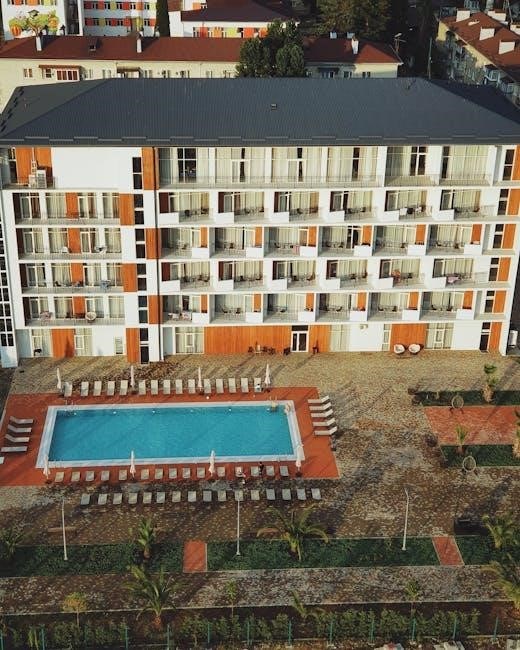Residential swimming pool regulations in Massachusetts ensure safety, legal compliance, and proper maintenance. They cover permits, safety standards, zoning laws, and electrical requirements for in-ground and above-ground pools.
Overview of State and Local Regulations

Massachusetts enforces a mix of state and local regulations for residential swimming pools to ensure safety and compliance. State laws provide baseline requirements, including permits, safety standards, and inspections. Local municipalities, however, may impose additional zoning rules, construction guidelines, and environmental regulations. Homeowners must adhere to both levels of governance, as local ordinances often tailor state regulations to specific community needs. This dual system ensures that pools are built and maintained safely while respecting neighborhood character and environmental concerns.
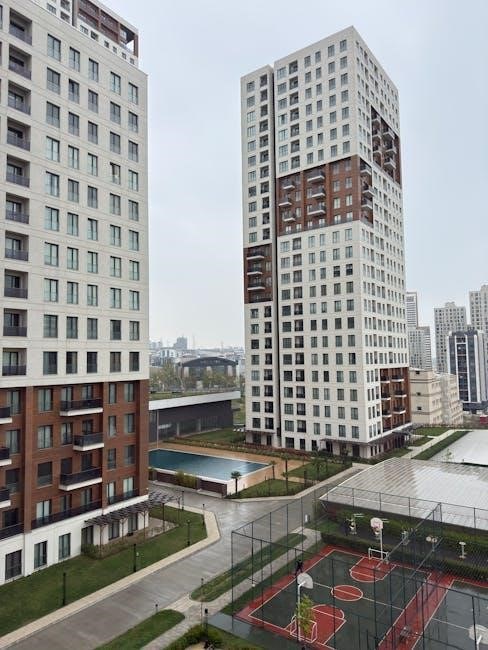
Definition of a Residential Swimming Pool
A residential swimming pool is defined as a structure designed for personal or family use, excluding public access, typically intended for recreational purposes by household members.
Residential Pool Classification and Usage Guidelines
Residential pools are classified based on usage, such as private or semi-private, and must adhere to specific guidelines. Private pools are for household use, while semi-private pools may accommodate limited guest access. Usage guidelines ensure pools are maintained for recreational purposes, excluding commercial activities. Compliance with health and safety standards is mandatory, and pools must not create nuisances or hazards. Proper documentation and adherence to local ordinances are required to maintain legal and safe operation of residential pools in Massachusetts.
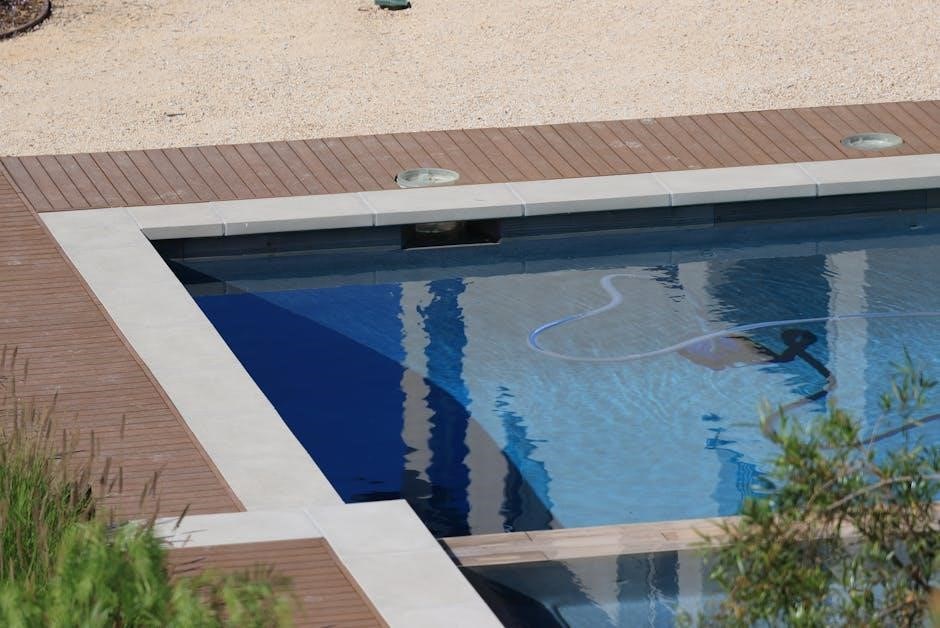
Permits and Fees for Swimming Pool Installation
A building permit is required for pool installation, with fees varying by type: $50 for above-ground and $100 for in-ground pools. Permits must be obtained before construction begins.
Building Permit Requirements and Associated Costs
A building permit is mandatory for residential pool installations in Massachusetts. Above-ground pools require a $50 permit, while in-ground pools need a $100 permit. These fees are non-negotiable and must be secured before construction begins. The permit process involves submitting detailed plans and specifications. Compliance with local building codes is essential to ensure safety and legal compliance. Failure to obtain the proper permits can result in fines or work stoppage. Adhering to these requirements is crucial for a smooth installation process.
Types of Permits Needed for Above-Ground and In-Ground Pools
Residential pools in Massachusetts require specific permits based on their type. Above-ground pools need a $50 permit, while in-ground pools require a $100 permit. Both types must comply with local building codes and safety standards. The permit process ensures that installations meet structural and safety requirements. Failure to obtain the correct permit can lead to fines or project delays. Proper documentation and inspections are mandatory for both pool types to guarantee compliance with state and local regulations.
Safety Standards and Fencing Requirements
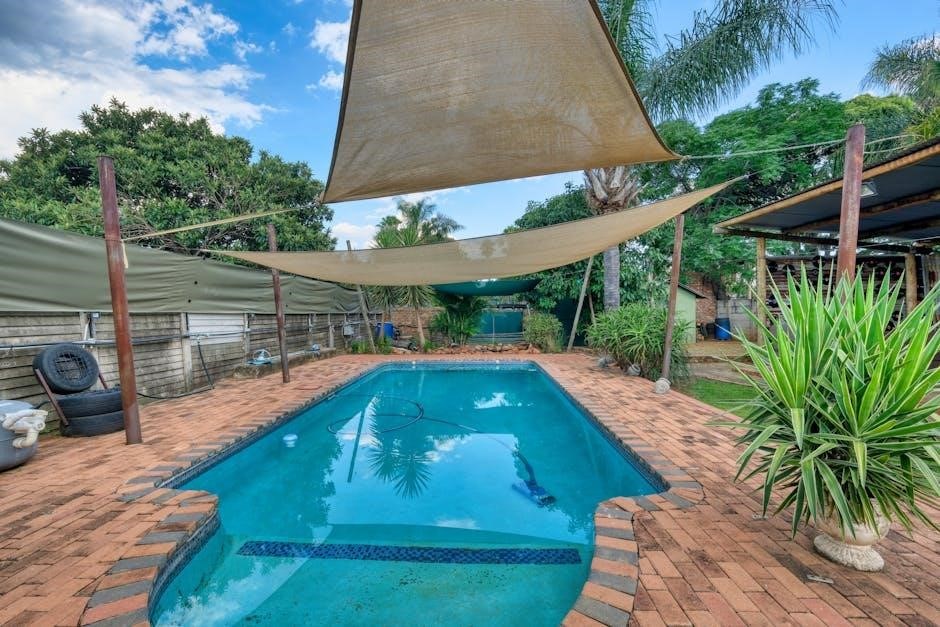
Residential pools in Massachusetts must meet strict safety standards, including mandatory fencing and gate specifications, to prevent accidents and ensure compliance with state regulations and codes.
Mandatory Fencing and Gate Specifications
Residential swimming pools in Massachusetts must be enclosed with a fence at least four feet tall, constructed of durable materials. Gates must be self-latching, open outward, and be equipped with a locking mechanism to prevent unauthorized access, particularly by children. Fencing and gates must comply with local building codes and safety standards to ensure maximum protection and minimize drowning risks; These specifications are strictly enforced to safeguard public health and safety.
Pool Safety Equipment and Alarm Systems

Massachusetts requires residential pools to install specific safety equipment and alarm systems to prevent accidents. Pool alarms must detect unauthorized access and sound an audible alert. Door and gate alarms leading to the pool area are also mandatory. Additionally, safety equipment like rescue poles and first aid kits must be easily accessible. These measures ensure compliance with state safety standards and help prevent drowning incidents. Regular inspections are conducted to verify the proper functioning of all safety devices.
Zoning and Setback Requirements
Zoning and setback requirements in Massachusetts mandate that pools comply with local ordinances, ensuring proper distances from property lines, structures, and neighboring land. Check local regulations.
Compliance with Local Zoning Laws
Compliance with local zoning laws is crucial for residential pool installation in Massachusetts. These laws regulate pool placement, size, and setbacks, ensuring harmony with neighborhood aesthetics and safety standards. Zoning requirements vary by town or city, so homeowners must verify specific ordinances before construction. Failure to comply may result in fines, project delays, or even pool removal. Always consult local authorities to ensure adherence to all zoning regulations and avoid potential legal issues.
Setback Distances from Property Lines and Structures
Residential swimming pools in Massachusetts must comply with specific setback distances from property lines and structures. These requirements ensure safety, prevent encroachment, and maintain neighborhood aesthetics. Setbacks typically vary by location, with pools often required to be a minimum of 10 feet from property lines and 15 feet from septic systems or water sources. Homeowners must consult local zoning maps and regulations to verify exact distances, as violations can lead to installation delays or fines. Proper planning ensures compliance and avoids legal complications.
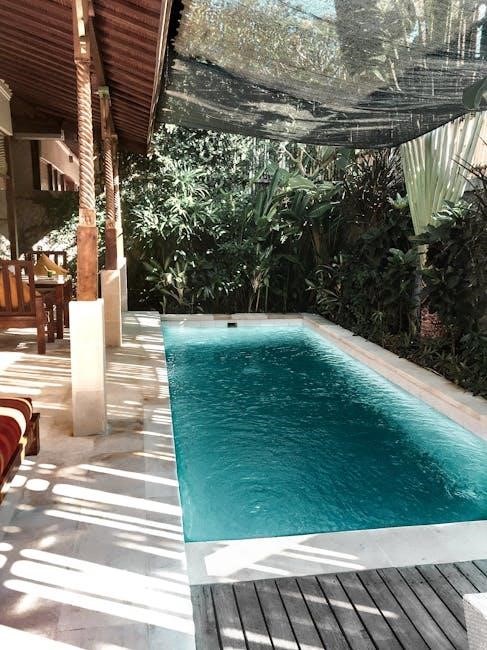
Electrical Wiring and Equipment Regulations
Residential swimming pools in Massachusetts must comply with state electrical codes, ensuring safe wiring and equipment installation. Proper grounding and bonding are required to prevent hazards.
Grounding and Bonding Requirements for Pool Equipment
Grounding and bonding are critical for electrical safety in residential pools. Equipment must be properly grounded to prevent electrical shocks. Bonding ensures all metal components are at the same electrical potential, reducing risk. Massachusetts requires compliance with the National Electric Code (NEC) standards for pool equipment. This includes using copper conductors and ensuring connections are secure. Regular inspections are mandatory to verify compliance. Proper grounding and bonding protect users and equipment, ensuring safe operation.

Compliance with State Electrical Codes
Compliance with Massachusetts state electrical codes is essential for safe pool operation. Pool owners must adhere to the National Electric Code (NEC) standards, ensuring proper wiring and equipment installation. Regular inspections are required to verify adherence, preventing safety hazards and legal penalties. Working with licensed professionals is crucial to meet all electrical code requirements, avoiding potential shutdowns and ensuring a safe environment for users.
Inspection and Compliance Process
The inspection process ensures pools meet safety and building codes. Pre-installation and final inspections are mandatory, verifying compliance with all regulations before approval.
Pre-Installation and Final Inspections
Pre-installation inspections ensure that all permits are in place and the site complies with zoning and safety regulations. Final inspections verify that the pool meets all safety standards, including fencing, gates, and equipment installation. These inspections are conducted by local building departments to ensure compliance with Massachusetts state laws and regulations, guaranteeing a safe and legally constructed swimming pool for residential use.
Consequences of Non-Compliance
Non-compliance with Massachusetts pool regulations can result in fines, penalties, and legal action. Failure to obtain necessary permits or meet safety standards may lead to enforcement orders, including pool removal. Repeat violations can escalate penalties, potentially halting pool use until compliance is achieved. Non-compliance also increases liability risks, as unsafe conditions may result in accidents. Authorities enforce these regulations strictly to protect public safety and ensure adherence to state and local laws.
Maintenance and Operational Guidelines
Regular testing of pool water quality is essential to ensure safety and clarity. Maintain proper chemical balance and cleaning schedules to prevent contamination and extend pool longevity.
Regular Testing and Maintenance of Pool Water Quality
Regular testing ensures pool water safety by monitoring pH, chlorine levels, and bacterial content. Owners must maintain proper chemical balances to prevent health risks and maintain clarity. Regular cleaning of filters and skimmers is also required to keep the water clean. Additionally, routine inspections of pool equipment help identify and address issues promptly. Proper maintenance not only enhances swimmer safety but also extends the pool’s lifespan and efficiency.
Record-Keeping and Reporting Requirements
Pool owners must maintain detailed records of inspections, permits, and water quality tests. Regular water testing logs should be kept, including pH levels, chlorine concentrations, and bacterial counts. Inspection reports from local authorities must be retained for compliance verification. Additionally, any repairs or maintenance performed on the pool or equipment should be documented. Accurate record-keeping ensures adherence to safety standards and facilitates reporting to local health and building departments when required.

Adhering to Massachusetts pool regulations ensures safety, legal compliance, and property value protection. Homeowners must stay informed and compliant to enjoy their pools safely.
Importance of Adhering to Massachusetts Pool Regulations
Adhering to Massachusetts pool regulations is crucial for ensuring safety, legal compliance, and property value protection. By following guidelines, homeowners prevent accidents, avoid fines, and maintain their investment. Compliance ensures pools are structurally sound and meet safety standards, protecting users and neighbors. Proper permits and inspections guarantee adherence to electrical, fencing, and zoning laws, promoting a safe and enjoyable swimming environment while maintaining community standards and property values.
